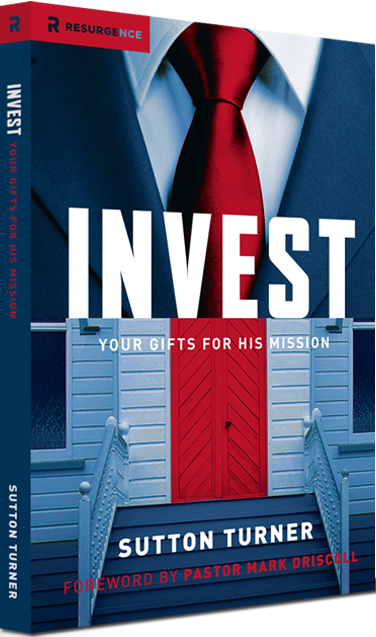Latest
-
Objections to the Christian Faith from the Unchurched and De-Churched
 Tue Dec 02, 2014
Tue Dec 02, 2014
by Resurgence -
Craig Groeschel: We Innovate for Jesus
 Tue Oct 14, 2014
Tue Oct 14, 2014
by Resurgence -
Mark Driscoll: Revelation
 Tue Oct 07, 2014
Tue Oct 07, 2014
by Resurgence -
RESURGENCE LEADERSHIP #034: JOHN PIPER, WHY I TRUST THE SCRIPTURES, PART 2
 Tue Sep 30, 2014
Tue Sep 30, 2014
by Resurgence -
Resurgence Leadership #033: John Piper, Why I Trust the Scriptures, Part 1
 Tue Sep 23, 2014
Tue Sep 23, 2014
by Resurgence

Archives
5 keys for reinvention

Growth brings change. Period. That’s true for big churches and small churches, and it’s true for people, families, corporations, and countries. If you want to function well at the next level, reinvention is absolutely necessary.
When a family starts having kids, a lot of reinvention takes place. New parents need to figure out what life looks like with less personal time and more demands. Another bedroom, a larger car, or a different neighborhood might be in order.
The church family is similar. An increase in attendance, a new service time, or a different location all require more volunteers, more detailed planning, a different communication strategy, and other adjustments. For fast-growing churches, reinvention is necessary for survival. For static churches, reinvention is an opportunity to reinvigorate the mission for another push forward. Either way, many of the considerations are the same.
1. Start with the leader
When change is required or desired, it must start with the leader. This is especially true in a church, where the lead pastor’s vision, strengths, and style wield a great deal of influence through the ministry of preaching. When Pastor Mark Driscoll turned 40, he took deliberate steps to transition from young-gun preacher to fatherly pastor. This shift sent a message throughout the church body that we were done with our childhood years and needed to move toward full maturity.
When a family starts having kids, a lot of reinvention takes place. The church family is similar.
Change for the leader isn’t just about aesthetics. When Mars Hill Church was in the midst of crisis, my fellow second-in-charge Pastor Dave Bruskas and I spent a lot of time focusing on Pastor Mark’s workload. The reinvention process starts with the leader, not only because he drives the vision, but because the rest of the organization will be in trouble if the leader doesn’t make it. Once the leader is in a good place, it’s much easier to reinvent the systems and structure of the organization.
2. Define the next level
For churches, the most obvious next-level marker is attendance. By no means is attendance the only way to measure progress, but if a church doubles in size, it will be on a new level in terms of its need for volunteers, a system for assimilating new people, more small groups, better communication, and someone to architect all of those adjustments.
When change is required or desired, it must start with the leader.
Besides attendance, a church may experience a new transition when a new leader takes over, when the congregation moves to a new building, or when young families start having kids, for example.
A church that waits for the next level to arrive before taking on these tasks will either be caught unprepared or the lack of initiative will become a self-fulfilling prophecy, with the church ceasing to grow and mature. If you fail to make the changes at your current level, you’ll probably never get to the next one.
3. Start all over
Success for a new church starting out in the pastor’s living room will look much different when that church moves into the community center, and once again when they buy their first building.
I started my first business right out of business school with no practical business experience, so I was at the very beginning. However, I made progress by getting various certifications, attending conferences, meeting with mentors, and learning from my mistakes.
Then, I started over again when I moved to the Middle East. I was working with billions of dollars and thousands of employees rather than millions and hundreds.
If you fail to make the necessary changes at your current level, you’ll probably never get to the next one.
For a church, starting over may include scrapping certain programs, drafting a new governance system, creating a new budget model, and in other ways rebuilding the infrastructure so that it can bear the future load.
4. Stay humble and learn
Success at one level does not guarantee success at the next level. Never assume you’re an expert on level five because you were an expert on level four. Stay humble. Instead of comparing yourself to others, seek to learn from them instead. Find someone who is a few steps ahead of where you want to be, drop them a line, ask questions, and learn. Look for opportunities to do the same for someone else.
5. Expect failures and mistakes
Progress inevitably includes failure, which is why many people and churches stay put. It’s far easier and far less scary to stick with what you know and slip into maintenance mode.
Without new challenges, however, new growth will cease. Try, fail, and at least you’ll end up learning something. Never try, never fail, and you’ll probably end up full of regret and bitterness against those who took a risk that paid off. Going to the next level most likely involves great pain, great humility, and great failure, but it all comes with the possibility of great fruit as the payoff.
Stay humble. Instead of comparing yourself to others, seek to learn from them instead.
Preparing for the next level is a healthy exercise, even if the transition is a long way off. It forces people to think about what’s working and what’s not, rather than settling for the status quo. Sometimes, the preparation itself can become a catalyst that sparks maturity and growth. As the lead pastor calls people to a vision of a destination, a strategic-thinking executive pastor figures out how to get there, level by level.
It’s the beginning of the year—a great time to consider the next level that Jesus has been preparing you for.
Are you a skilled businessman who has felt the call to serve God and his church, but you’re just unsure how? Let me encourage you to pray, seek God, and consider applying for the Executive Pastor Residency at Mars Hill Church.
Happy New Year!
For more on the calling and role of an Executive Pastor, pick up a copy of Sutton Turner’s Invest: Your Gifts for His Mission today. You can also find him on Twitter and writing for the Resurgence.
